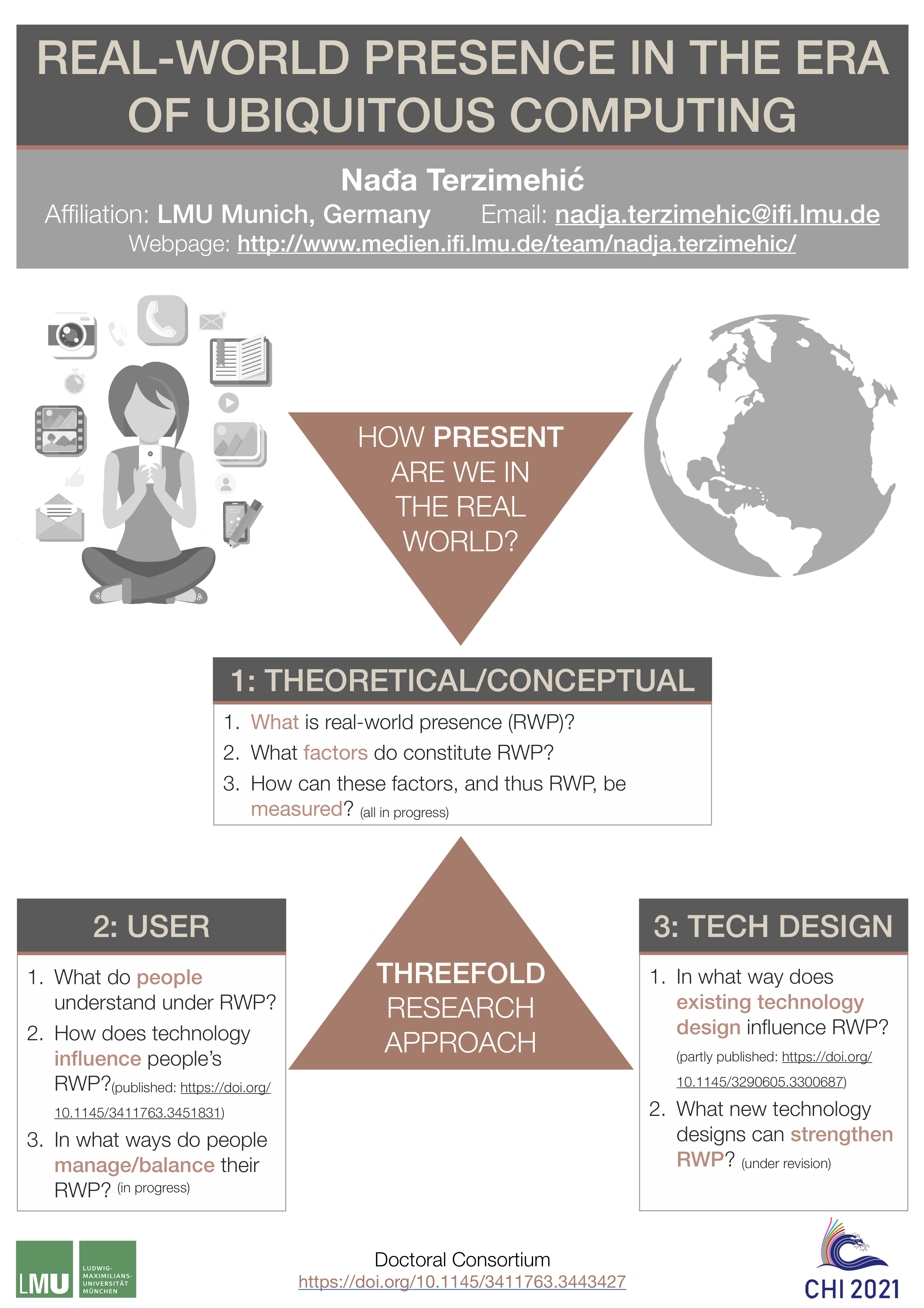We are happy to present you this year’s contributions from the German HCI labs to CHI 2021! Feel free to browse our list of publications: There are 53 full papers (including one Best Paper and five Honorable Mentions), 16 LBWs, and many demonstrations, workshops, or other interesting publications. Please send us a mail if you feel that your paper is missing or to correct any entries.
Questionnaires and Qualitative Feedback Methods to Measure User Experience in Mixed Reality
Tobias Drey (Ulm University), Michael Rietzler (Ulm University), Enrico Rukzio (Ulm University)
Abstract | Tags: Other | Links:
@inproceedings{2021DreyQuestionnaires,
title = {Questionnaires and Qualitative Feedback Methods to Measure User Experience in Mixed Reality},
author = {Tobias Drey (Ulm University) and Michael Rietzler (Ulm University) and Enrico Rukzio (Ulm University)},
url = {https://arxiv.org/abs/2104.06221},
doi = {-},
year = {2021},
date = {2021-05-01},
abstract = {Evaluating the user experience of a software system is an essential final step of every research. Several concepts such as flow, affective state, presences, or immersion exist to measure user experience. Typical measurement techniques analyze physiological data, gameplay data, and questionnaires. Qualitative feedback methods are another approach to collect detailed user insights. In this position paper, we will discuss how we used questionnaires and qualitative feedback methods in previous mixed reality work to measure user experience. We will present several measurement examples, discuss their current limitations, and provide guideline propositions to support comparable mixed reality user experience research in the future.},
keywords = {Other},
pubstate = {published},
tppubtype = {inproceedings}
}
Evaluating the user experience of a software system is an essential final step of every research. Several concepts such as flow, affective state, presences, or immersion exist to measure user experience. Typical measurement techniques analyze physiological data, gameplay data, and questionnaires. Qualitative feedback methods are another approach to collect detailed user insights. In this position paper, we will discuss how we used questionnaires and qualitative feedback methods in previous mixed reality work to measure user experience. We will present several measurement examples, discuss their current limitations, and provide guideline propositions to support comparable mixed reality user experience research in the future.
Real-World Presence in the Era of Ubiquitous Computing
Nađa Terzimehić (LMU Munich)
Abstract | Tags: Other | Links:
@inproceedings{2021TerzimehicRealWorld,
title = {Real-World Presence in the Era of Ubiquitous Computing},
author = {Nađa Terzimehić (LMU Munich)},
url = {https://www.medien.ifi.lmu.de/, Media Informatics Group LMU Munich
http://www.medien.ifi.lmu.de/team/nadja.terzimehic/Poster_DC_BetweenWorlds_white.png, Doctoral Consortium Poster},
doi = {10.1145/3411763.3443427},
year = {2021},
date = {2021-05-01},
abstract = {In the era of everyday ubiquitous computing, all of us have at least once lost track of time, space or our social environment when using our smartphone. In such situations, we might not feel present in the here and now in the physical real world. Presence has been a long term topic of interest in virtual reality research as the feeling of being there, in a technology-mediated virtual world. However, we have yet to understand our feeling of being here and now in the physical real world under the wide availability and easy accessibility of smartphones. In my thesis, I want to examine the concept of real-world presence from a theoretical, users’ and technology development perspective. I aim at understanding current and developing new mobile solutions, with the goal of supporting our presence in the physical real world.},
keywords = {Other},
pubstate = {published},
tppubtype = {inproceedings}
}
In the era of everyday ubiquitous computing, all of us have at least once lost track of time, space or our social environment when using our smartphone. In such situations, we might not feel present in the here and now in the physical real world. Presence has been a long term topic of interest in virtual reality research as the feeling of being there, in a technology-mediated virtual world. However, we have yet to understand our feeling of being here and now in the physical real world under the wide availability and easy accessibility of smartphones. In my thesis, I want to examine the concept of real-world presence from a theoretical, users’ and technology development perspective. I aim at understanding current and developing new mobile solutions, with the goal of supporting our presence in the physical real world.
